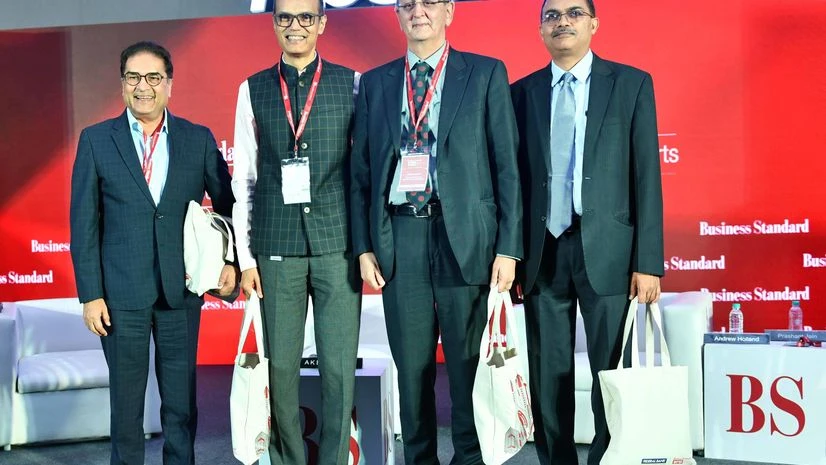Rising US bond yields, flare up in geopolitical tensions, and uncertain global economic outlook pose short-term risks, but India remains in a structural bull market, and valuations are nowhere close to bubble territory was the underlying belief among India's market mavens who spoke at the Business Standard BFSI Summit,
"India Inc has delivered 30 per cent profit growth this quarter against expectation of 25 per cent. India's growth delivery is 3-4 percentage point higher (than Street estimates). Earlier, consensus growth used to be 25 per cent, and actual growth was 10-12 per cent. This is a different cycle where earnings upgrades are happening. There are challenges, such as selloff from foreign portfolio investors (FPIs). However, still, I think the index can double in the next four years and quadruple in the next 10 years," said Raamdeo Agrawal, chairman, Motilal Oswal Financial Services, adding that the market trajectory will closely track the earnings growth.
Ridham Desai, managing director India, Morgan Stanley, said the Indian economy made tremendous progress in terms of macro stability, which has made the domestic markets more resilient to global headwinds.
"Fed has raised rates at the fastest pace since 1980, yet it has not made any impact on India. In 2013, the Fed just said taper, and Indian stocks fell 20 per cent," said Desai. "This shift that has happened with respect to how India reacts to global interest rates is a consequence of the shift in macroeconomic stability driven by narrowing current account deficit, drop in exports and oil intensity of GDP."
Andrew Holland, chief executive officer (CEO), Avendus Capital Alternate Strategies, also concurred that India is in a good spot but said we can't remain immune to what's happening in the world.
"We are in a messy world from higher bond yield in the US, high oil prices and the Israel-Gaza war. Also, there interest rates have risen very quickly in the US. The unintended consequences of it are yet to play out, which could lead to global shocks. India may fall less than other global markets," he said.
More From This Section
Prashant Jain, CIO of 3P Investment Managers, said the General Elections can be a source of volatility, but the good thing is that all governments have continued the reform process.
"India has grown at 6 per cent annually in the past decade, but it has the potential to grow much higher, maybe 7-8 per cent for the current decade and next. Short-term is always uncertain, but markets look reasonably valued considering the estimated earnings growth potential. In the past, remaining bullish on India has always paid off over the medium- to long term. And it will turn out the same in the future as well," said Jain.
On the debate on whether debt looks attractive vis-à-vis equities. Jain said both deserve a place in one's portfolio, and the individual's risk appetite should determine the mix. "Long-term money should go into equities but it should be in tolerance for volatility," he said.
Holland said he would prefer debt at this juncture and when interest rates fall, he would rotate into equities. "short-term debt and long-term equity," he said.
Desai pointed out that longer-term equity always outperforms. "Equity is the best-performing asset class over the long-term. But there will be a lot of volatility over the next 12 months in equities. You need to have the risk appetite to handle that," he said.
Agrawal said there has been a dramatic shift in returns offered by the debt markets for the developed world from near-zero to 5 per cent, but for India, the coupon hasn't moved up that much, and the real rates aren't that high as inflation is over 5 per cent.
"At 1 per cent real rate, it will take 72 years to double the money. But in equities, you can double it in seven years," he said.
On possible headwinds facing the domestic equities, Desai said in the short-term, could be the elections, and in the long-term, it is the global economic distress.
Jain also highlighted some key risks he perceives at this juncture.
"If there is a further spike in US yields, it will impact India as domestic yields will move in tandem. If one more round of selling comes, it could lead to a knee-jerk reaction. The small and mid-cap space also has some excesses. I would be very cautious about that," he said.
A sharp selloff, if any, would be a good buying opportunity, something most panel members were synonymous with.
Holland said one should reflect on why the returns generated by the domestic markets over the past two years have been flat. He said the winning formula could be to look at themes which are "below the index". Some themes he cited were electronic manufacturing, premiumisation in beverages (both alcoholic and nonalcoholic) and the defence spending themes.
"Such themes can make you a lot more money than the index," he opined.
Experts also said one needs to be cautious about the small- and mid-cap segment," Holland said.



)
